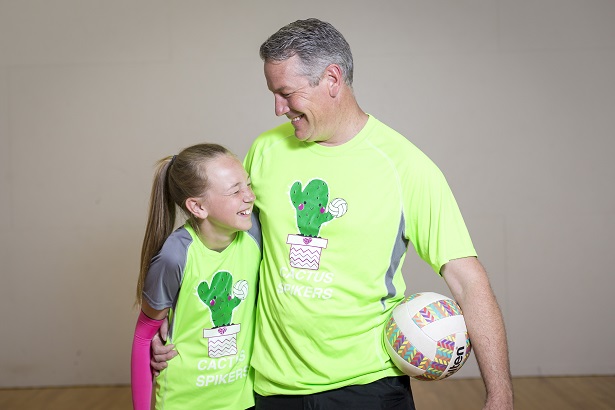
By Deborah Hillcove
Every day is Father’s Day for Tim Brotherton, Tempe Family YMCA coach and father to 11-year-old Regan. And while fathers throughout America celebrate their special day on Sunday, June 18, Brotherton will also be celebrating his birthday and hoping to talk his wife into playing a round of golf.
When he was an 8-year-old, Brotherton began playing basketball. In fact, he played at the Tempe Y, little imagining he would one day be coaching there.
The facility sponsors a variety of activities for a healthy lifestyle and currently offers a summertime camp for kids. Brotherton adds that “the ‘Y’ offers an affordable way to get kids introduced to sports and coaching that can otherwise cost thousands of dollars for families.
It’s a great avenue for allowing kids to try multiple sports in a low pressure and risk environment.”
Last season, Brotherton coached a mixed volleyball team of 4th through 6th graders. Although he played basketball in high school, he says, “I started playing volleyball and really fell in love with the game.”
Now he shares that love of the game with elementary students.
Asked about the qualities of a good coach, he says, “I think the most important thing for a coach for kids is a belief that sports and competition have a positive impact on kids and their development. You have to enjoy teaching.”
Complimenting his wife for her help and organizational skills, he continues, “You have to be able to maintain a positive attitude and realize that winning and losing are both lessons that kids have to learn.”
Although last season’s volleyball team consisted of many new players, he says, “Watching them get better over the course of two months was incredible. We didn’t win a lot but there were some great moments where the kids executed something we’d worked on in practice or did something completely unexpected that I didn’t think they were capable of. Those are the best moments, to see the joy on their faces when they are successful.”
With so many young players learning the game, mistakes were bound to happen. He encouraged them to learn from a mistake, keep their heads up and focus. At the end of every game, though, he says they all were “looking forward to slap hands, do knee pad slides under the net and of course, have after-game snacks.”
His favorite memories from the season came at the end of each practice, when the team would work on spiking, that powerful move of forcefully slamming the ball over the net and onto the opponent’s court.
He says, “Since our oldest players are 6th graders, spiking isn’t really happening, but I’m trying to set up their footwork and approach for the next level and to have some fun. I was amazed at how well they did. “
Giving an example, he says, “We had one girl on the team who couldn’t be more than 4 feet tall but by the end of the season she was one of the best at getting the approach to the ball correct and hitting it over the net with some pace.
“Again, just watching them develop and succeed is pretty special and gratifying.”
Brotherton makes it clear that being a coach is an extension of being a good father to his daughter.
“I do my best to be engaged and be there for my daughter. I love spending time with her during the fun times, but also try to make sure that I’m helping her during the tougher things she has to do as well.
“It’s important to me that my daughter understands that I have a lot of expectations for her, a lot of faith in her ability to accomplish her goals and that I’ll always be there to love and support her.”

